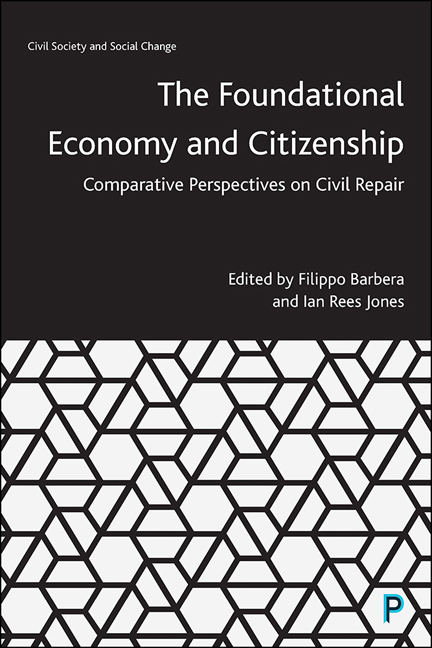Book contents
- Frontmatter
- Contents
- List of Figures and Tables
- Notes on the Editors and Contributors
- Acknowledgements
- Introduction
- 1 The Foundational Economy and the Civil Sphere
- PART I Governance and Public Action
- PART II Housing and Urban Life
- PART III Water and Waste
- PART IV Food
- Conclusions and new policy directions
- Index
9 - Changing Food Supply Chains: The Role of Citizens and Civil Society Organizations in Working Towards a Social Economy
Published online by Cambridge University Press: 12 March 2021
- Frontmatter
- Contents
- List of Figures and Tables
- Notes on the Editors and Contributors
- Acknowledgements
- Introduction
- 1 The Foundational Economy and the Civil Sphere
- PART I Governance and Public Action
- PART II Housing and Urban Life
- PART III Water and Waste
- PART IV Food
- Conclusions and new policy directions
- Index
Summary
Introduction
In recent decades, the penetration of the financial economy into the dynamics of everyday life has involved a significant ‘value extraction’ process, extraction that is more evident in those sectors dealing with the creation and distribution of goods and services consumed by the whole population that are basic for individuals and families. These processes concern not only private enterprises, whose focus is to chase financial accumulation strategies, to the detriment of wages (Salento and Tafuro, 2018), but also public authorities providing health services, childcare and care for the elderly, education, food supply and distribution, water, gas, electricity, phone networks and sewers. All these elements are the main essentials of material life (Braudel, 1981) and deal with an area recently defined as the foundational economy (Bentham et al, 2013; Barbera et al, 2016; Froud et al, 2018, 2019).
The privatization of essential sectors such as these facilitated what is called the ‘financialization of welfare’ (Caselli and Dagnes, 2018). In some specific settings such as old age or health, this has caused new forms of inequalities among families or individuals (Dagnes, 2018).
The consequences of this economic model also concern agriculture and the food distribution networks connected to them. In this environment – especially in peripheral areas – the contradictions implicit in the neoliberal dynamic are revealed: rural farming becomes gradually marginalized and industrialized agricultural jobs increasingly unstable, edging ever closer towards exploitation. This is what van der Ploeg called a ‘squeeze on agriculture’, and he described its consequences as follows:
A dramatic strengthening of the already existing squeeze on agriculture is one of the most visible consequences: although we see temporary upheavals, off-farm prices are, on the whole, nearly everywhere under pressure. This introduces strong trends towards marginalization and new patterns of dependency, which, in turn, trigger considerable repeasantization – whether in the developing world or in industrialized countries. Repeasantization is, in essence, a modern expression of the fight for autonomy and survival in a context of deprivation and dependency. The peasant condition is definitively not static. It represents a flow through time, with upward as well as downward movements. Just as corporate farming is continuously evolving (expanding and simultaneously changing in a qualitative sense – that is, through a further industrialization of the processes of production and labour), so peasant farming is also changing. And one of the many changes is repeasantization. (van der Ploeg, 2008: 6–7; emphasis added)
- Type
- Chapter
- Information
- The Foundational Economy and CitizenshipComparative Perspectives on Civil Repair, pp. 207 - 228Publisher: Bristol University PressPrint publication year: 2020



